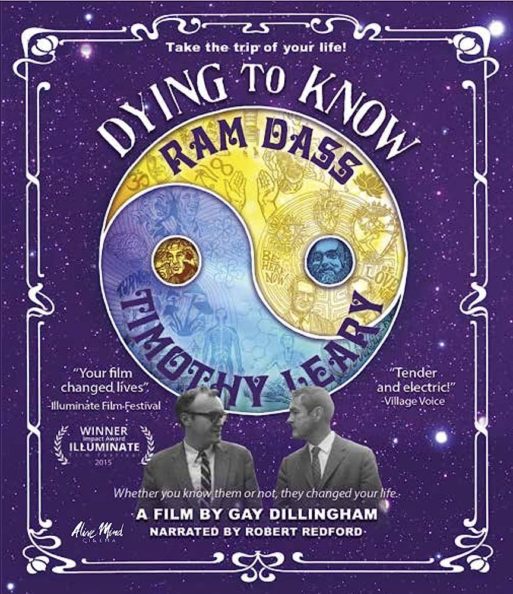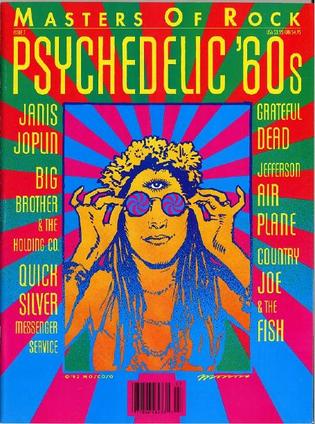 I’m not of the Timothy Leary generation, but I am on its cusp. The way in which he influenced us is not foreign to me, nor are the psychedelics he introduced into our culture back then. On the other hand, his contemporary, Ram Dass is a complete mystery. So, naturally I jumped at the opportunity to see the premiere of “Dying to Know: Ram Dass & Timothy Leary” at the Mill Valley Film Festival. Directed by Gay Dillingham, its intent is an exploration of the process of dying–which I was dying to know.
I’m not of the Timothy Leary generation, but I am on its cusp. The way in which he influenced us is not foreign to me, nor are the psychedelics he introduced into our culture back then. On the other hand, his contemporary, Ram Dass is a complete mystery. So, naturally I jumped at the opportunity to see the premiere of “Dying to Know: Ram Dass & Timothy Leary” at the Mill Valley Film Festival. Directed by Gay Dillingham, its intent is an exploration of the process of dying–which I was dying to know.
The title’s wordplay runs throughout the film, wavering on and off again (though more off than on). The film is composed of intermittent footage of a conversation Leary and Ram Dass had just month’s before Leary’s death in 1996. It’s spliced with documentary intersections of their journey together, which helped shape the counterculture years — and we do learn a good bit about Dass. I was surprised to learn his real name was actually Richard Alpert back in the day. He cavorted with Leary, as well as filling in as Leary’s partner, both during and between Leary’s string of wives, girlfriends, and infidelities. Later in the film, when Ram Dass speaks candidly about his gay sexuality, their relationship takes on a slightly different dimension in the viewer’s mind.
The film even kicks off with a scene of a dying Leary, with one of his prolific sound bites of how he’s “running towards Miss Death.” It’s very sensational–very ‘Leary’. And the film does not disappoint with many more such kernels. We witness Leary and Alpert’s lengthy relationship, readily apparent in their words, affection, cadence and mannerisms expressed in the interview. Dying to Know takes us tediously through their individual histories, from birth to connecting as friends and the subsequent drug experimentation days But, unfortunately, the film quickly flashes into TV grade maneuvers of tired old photos and lackluster, optical 60’s graphics.
The director’s intent may have been to create a historical view of two great men’s reflection on life and death. However, the overriding emerging theme is a didactic view of how LSD was developed and became so integral to the counterculture of the time. About two-thirds of the way in I was so inundated with images of psychedelic mushrooms, the film began wearing on me like a bad acid trip.
Both the film and Leary would like to lead you to believe that the larger-than-life looming Leary single-handedly created the Boomers’ counterculture, but in reality he contributed to it along with many others. Ram Dass and Leary’s dialogue feels like more of a self-congratulatory club than a true, conscious exploration of the dying process, especially when I watch Ram Dass snicker at points and refer to himself in the third person as Richard Alpert — moments I found incredibly disturbing.
What is notable about this film is its discussion of the concept of “conscious dying”, which began over 30 years ago when Steven Levine, Ram Dass and Dale Borglum began a project to practice and teach dying as a truly conscious experience. In other words, as one interviewee exclaims, “Opening [your] mind to a spiritual journey.” I have to say, these men were way ahead of their time and in many ways I am awed by their insight. Sadly, however, the film barely touches on this concept. It’s a shame, as it’s one that the Boomers are now finally ready to grasp and embrace as they face their own mortality.
By the film’s end, I felt stunned (perhaps love-bombed?) by the potency of Leary’s overwhelming and megalomaniacal personality, which speaks more of familiar histrionics than worthy history. Unfortunately, I respected Leary much more before I learned this much– too much, let’s say–about him. Overall, the weighty drug theme of this film is as overloaded as Timothy Leary’s shiny, luxury car that he would “drive up (north in) to buy huge amounts of LSD, paid for with Harvard checks” (as admitted by Ram Dass, bragging directly to the camera with child-like glee). It was a moment that rather summed up the depth of the film.
It seems Dying to Know was not the experience that would answer my questions, or give me a true understanding of Ram Dass–the man I have heard so much about.
Dying to Know Teaser from Gay Dillingham on Vimeo.
Check out past posts exploring Leary’s research of psychedelics as part of the dying process and conscious dying:
- An “Intelligent Form of Dying”: Aldous Huxley’s psychedelic death. Aldous and laura Huxley embraced LSD’s potential to create an eye-opening end-of-life experience.

 ”Dying to Know: Ram Dass & Timothy Leary” by Gay Dillingham
”Dying to Know: Ram Dass & Timothy Leary” by Gay Dillingham




 How Dare You Die Now!
How Dare You Die Now!
 Debating Medical Aid in Dying
Debating Medical Aid in Dying
 “Help Me, Helen”
“Help Me, Helen”














